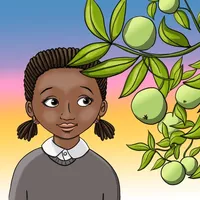⟪ 칼라이는 식물에게 말해요 ⟫
Kalai|à la plante|
Kalai|to the plant|tell
カラは||
⟪ Khalai talks to plants ⟫
여긴 칼라이에요.
|c'est Kalai
this is|it's Kali
This is Carla.
Bu Carla.
그녀는 일곱살이죠.
|a sept ans
she is|is seven
|7歳です
she is seven years old
o yedi yaşında
그녀의 이름은 그녀의 말 루북수로 “좋은 아이” 라는 뜻이에요.
|nom|||Rubuksuro||enfant||signifie
her|name is|her|word|Lupus|good|child|called|meaning
||||ルブクスロ||||
Her name means “good child” in her language, Lubuksu.
Adı kendi dilinde “iyi çocuk” anlamına geliyor, Lubüksu.
칼라이는 일어나서 오렌지 나무에게 말해요.
Kalai||orange|à l'arbre|
Kalai|getting up|orange|to the orange tree|tell
|||オレンジの木に|
Khalai gets up and tells the orange tree.
Khalai ayağa kalkar ve portakal ağacına söyler.
卡莱站起来告诉橘子树。
“오렌지 나무야, 크게 자라서 우리에게 많은 잘 익은 오렌지를 주렴.”
orange|arbre||en grandissant||||mûr|oranges|donne
orange tree|tree|big|grow|us|many|ripe|ripe|oranges|give
“Orange tree, grow tall and give us many ripe oranges.”
"Portakal ağacı, büyüyün ve bize birçok olgun portakal verin."
“橘子树,长高吧,给我们带来许多成熟的橘子。”
칼라이는 학교로 걸어가요.
Kalai|à l'école|
Karai|to school|I walk
Khalai walks to school.
가는 길에 풀에게 말해요.
|route|à l'herbe|
going|on the way|to the grass|I talk to
On the way, talk to Poole.
Yolda Poole ile konuşun.
“풀아, 더 초록색으로 자라고 마르지 말렴.”
herbe||vert|pousse|ne sèche|ne sois pas
grow|more|green color|grow|wither|wither
“Remove it, grow greener and don’t dry out.”
"Kaldır onu, daha yeşil büyü ve kurumasın."
“把它拿掉,长得更绿,别晒干了。”
칼라이는 야생화를 지나쳐가요.
Kalai|fleur sauvage|passe
Kalai|wildflowers|passes
Khalai walks past wildflowers.
Khalai kır çiçeklerinin yanından geçer.
“꽃들 아, 계속해서 피어나서 너희를 내 머리에 꽂을 수 있게 해주렴.”
|||fleurissant|||||||
flowers|oh|continuously|bloom|you|my|in my hair|stick|to be able|to be able to|help
“Flowers, continue to bloom so that I can put you in my hair.”
"Çiçekler, açmaya devam et ki seni saçıma koyayım."
학교에서, 칼라이는 단지 중앙의 나무에게 말해요.
|Kalai||||
school|Kalai|only|central||talks
At school, Khalai just talks to the tree in the middle.
Khalai okulda sadece ortadaki ağaçla konuşuyor.
“나무야, 큰 가지를 뻗어서 우리가 네 그늘 아래서 읽을 수 있게 해주렴.”
arbre||||||ombre|||||
||branch|reach|we|you|shade|under|to read|can|so that|help us
“Tree, put out a big branch so that we can read under your shade.”
"Ağaç, büyük bir dal çıkar da gölgende okuyalım."
칼라이는 학교를 둘러싼 생울타리에게 말해요.
Kalai|||à la haie vive|
||surround|to Sang-woo|
Khalai tells the hedge around the school.
Khalai, okulun etrafındaki çiti anlatıyor.
“강하게 자라서 나쁜 사람들이 들어오는 걸 막아주렴.”
fort||||entrent||empêche
strongly|growing up|bad|people|coming|thing|block
“Grow strong and stop bad people from coming in.”
"Güçlen ve kötü insanların içeri girmesini engelle."
칼라이가 학교에서 집으로 돌아올때, 오렌지 나무에게 들려요.
Kaliga|||quand|orange||il parle
Kaliga|at school||coming back|||hears
When Khalai returns home from school, she is stopped by an orange tree.
Khalai okuldan eve döndüğünde bir portakal ağacı tarafından durdurulur.
“네 오렌지는 아직 익었니?” 칼라이가 물어요.
|orange||est mûre|Kalai|demande
|orange||ripe|Kalaiya|asks
“Are your oranges ripe yet?” Khalai asks.
"Portakalların olgunlaştı mı?" diye soruyor Khalai.
“오렌지가 아직 초록빛이구나,” 칼라이가 한숨을 쉬어요.
orange||est encore vert|Kalayga|soupir|soupire
orange||green|Kallai|sigh|sigh
“Oranges are still green,” Khalai sighs.
Khalai, "Portakallar hâlâ yeşil," diye iç çekiyor.
“내일 보자, 오렌지 나무야.” 칼라이가 말해요.
|voir|orange|arbre|칼라이가|
|see|||Kalai|says
“See you tomorrow, orange tree.” Khalai says
"Yarın görüşürüz portakal ağacı." Khalai diyor
“어쩌면 그 때는 네가 날 위해 잘 익은 오렌지를 가지고 있을 수 있겠지!”
||moment||||||orange||||il y aura
maybe|that|at that time|you|me|for me|well-ripened|ripe|ripe orange|you might have|you might have|be able to|might have
“Maybe then you can have a ripe orange for me!”
"Belki o zaman benim için olgun bir portakal yersin!"

